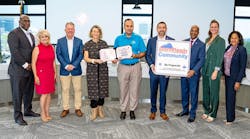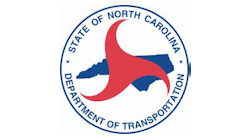JTA, NCDOT and WSDOT work on improving ferry transit services
The Jacksonville Transportation Authority (JTA), North Carolina Department of Transportation (NCDOT) and Washington State Department of Transportation (WSDOT) have each made investments to upgrade their ferry transit programs.
JTA receives funds for new diesel hybrid-electric vessel
The U.S. Department of Transportation (USDOT) will be supporting the JTA with $15.6 million to purchase a new diesel hybrid-electric ferry to supplement the agency’s existing St. Johns River Ferry service. State representatives and JTA leadership celebrated this move to invest in better ferry transit options for riders.
"The St. Johns River Ferry is an iconic mode of transportation for Northeast Florida, providing important connectivity for the Ft. George Island and Mayport areas," said JTA CEO Nathaniel P. Ford. "This investment by the U.S. Department of Transportation toward an additional environmentally sustainable vessel means we can provide more reliable and efficient mobility to our community."
With this award, since taking over operation of the St. Johns River Ferry in 2016, the JTA has secured over $35 million in discretionary grants which, along with the local match, translates to significant capital upgrades to the St. Johns River Ferry of over $55 million.
"This is another exciting grant win that is a result of our fantastic collaboration with the JTA, relationships we’ve built with the Biden-Harris Administration and the dedicated work of the grant writing teams," said Jacksonville Mayor Donna Deegan. "The new hybrid-fuel ferry vessel will increase connectivity, sustainability and economic competitiveness for the historic communities of Mayport Village and Fort George."
With only one ferry in JTA’s fleet, service must be suspended for several weeks annually while JTA maintains the vessel. The purchase of a second ferry with the $15.6 million USDOT grant will ensure JTA can provide uninterrupted service to passengers during regularly scheduled maintenance.
"The St. Johns Ferry serves as an indispensable connector for Florida’s State Road A1A," said Rep. John Rutherford (R-FL-05). "Repairs and maintenance to the one vessel currently running back and forth across the St. Johns River, however, means unnecessary delays and closures for Northeast Floridians who rely on this service daily. That’s why I was proud to help secure a grant from the Federal Transit Administration for an additional ferry to prevent disruptions in this essential service and to ensure our piece of Florida’s iconic thoroughfare remains connected."
NCDOT christens two new vessels
The NCDOT’s ferry division honored the launch of its two newest vessels during a ceremony at the Cherry Branch Ferry Terminal in Havelock.
The Motor Vessel Avon and Motor Vessel Salvo river-class ferries are larger than the two Hatteras-class ferries they’re replacing, which are both more than 30 years old. The two new ferries are part of an ongoing effort by the agency to upgrade and modernize its aging ferry fleet to help reduce maintenance costs.
“These ferries represent more than just vessels,” said NCDOT Ferry Division Director Jed Dixon. “They embody progress, innovation and a connection to our communities.”
To honor the launch, the two new vessels were christened in an ancient maritime tradition to welcome new vessels into the fleet.
The vessels are currently in service on the Cherry Branch-Minnesott Beach route.
WSDOT continues modernization work of Wenatchee ferry
The WSDOT is working to modernize its Wenatchee ferry. After one year at Vigor shipyard, the ferry improvements are progressing and include the necessary and long-planned upgrade to its aging propulsion system and conversion to hybrid-electric power. Washington State Ferries (WSF) originally estimated work would take roughly a year to complete and now expects a return to service summer 2025.
WSF awarded a contract to Vigor in September 2023 to convert its Jumbo Mark II class ferries to hybrid-electric power and complete the required propulsion system upgrades, ensuring the vessels remain reliable for their 60-year lifespans. The three ferries, the Wenatchee, Tacoma and Puyallup, were built in 1998, 1997 and 1999 respectively.
“There are no issues with the technology itself, but as is common with major vessel retrofits, we have faced some challenges in working this new technology into the existing vessel. Working with Vigor, we have largely tackled these issues and are now preparing for system commissioning. We’re also applying our lessons learned for the subsequent vessels,” said Matt von Ruden, administrator for the WSF System Electrification Program.
Major work already completed on Wenatchee includes the removal of two propulsion diesel generators, installation of electric power conversion and distribution equipment, upgrades to obsolete propulsion control equipment, reconfiguration of piping systems and the build-out of two new battery rooms. Ongoing work includes installation of thousands of feet of electric and fiber optic cable. From there, the battery modules will be installed, and crews will begin to bring the ferry back to life. This commissioning process is a highly structured sequence of energizing system components and testing them to ensure they operate as designed.
After ferry update work is complete, the WSF team predicts it will need approximately four weeks to put Wenatchee through its paces with additional system checks and sea trials, as well as training for the vessel crews. The Tacoma conversion will not begin until the Wenatchee returns to service.
“The benefits of this program are substantial,” von Ruden said. “When these propulsion upgrades are complete, the Wenatchee will emerge with improved reliability, increased efficiency and reduced emissions.”
The conversion of all three vessels and their supporting terminals will reduce WSF’s diesel fuel consumption by over 4.7 million gallons per year. The designs will support three modes of operation – diesel, battery or hybrid-diesel battery – providing increased reliability and resilience.

Eman Abu-Khaled | Associate Editor
Eman Abu-Khaled is a graduate of Kent State University with a bachelors in journalism. She works through Endeavor Business Media with Mass Transit as an associate editor. Abu-Khaled brings a fresh perspective to the visual side of journalism with an interest in video and photography work.





